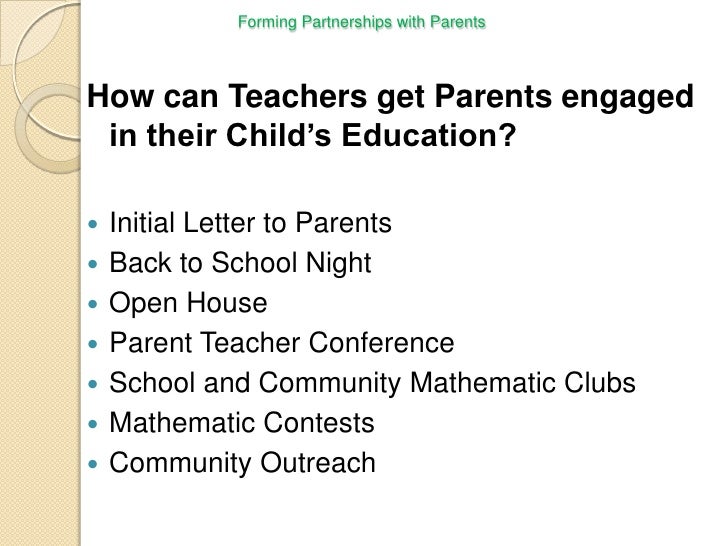Learning Leaders. (2011, March 11). Family engagement = student success. Retrieved from https://www.youtube.com/watch?v=gwEPv2ob_QI
Morrow, J. (2010). [Graphic illustration October 22, 2015]. Forming Partnerships With Parents. Retrieved from http://www.slideshare.net/jim1035/presentationforming-partnerships-with-parents
Not only are there
parents who do not put effort into their children’s education, but it is
surprising that there are many aspects needed in the process of parent
partnership with school. As Auerbach (2010) states, partnership needs to
involve parent’s commitment and social justice, which is the understanding,
acceptance, and promotion of all cultures and types of family. I agree that
parents need to be motivated in participating within their child’s schooling, but
also on a community-based level of different children, cultures and families
within the school. I believe that the best way to get parents involved is through communication and formation of belongingness, which could
occur through family centers, phones calls and event (Henderson, et al. 2007).
I believe that teachers should use great efforts to try and motivate parents into becoming involved in the
school community, no matter their race, social status, or culture. Check out the 66 ways to improve parental engagement from teachers perspectives.
The most successful way to develop parental involvement within the school is to carry out education in the
home as it increase student’s achievement (Shumon, ND). When
education is carried out in the home, students are constantly learning and
developing in stages. Not only does home education scaffold the child’s
learning, it motivates children to do better and parents to develop interest in the class. Homework is the number one tool that teachers use to keep parents involved in the child’s
education (Shumon, ND). Not only does homework allow parents to help their children, but it
also gives parents a insight on the class content. In addition to homework, there are take home packs. These take home packs give parents a voice as they
could comment on the parent logs and express their individual concerns. Not only is this take home pack worthy
for parents to voice their opinions, but it is an efficient way to have
successful parent-teacher communication. There are
tools that teachers need to follow in order to gain parental engagement. These tools will welcome family
communication, support students, speak up for students, share power and
collaborate with community (Hammack, 2012).
PTO Today. (2013, July 26). Parent involvement matters! Retrieved from https://www.youtube.com/watch?v=nOhZ6U5yaXA
References
Auerbach,
S. (2010). Beyond coffee with the principle: Towards leadership for authentic school- family
partnership. Journal of school leadership.
partnership. Journal of school leadership.
Hammack, B., Foote,
M., Garretson, S, & Thompson, J. (2012). Family literacy packs: Engaging
teachers, families, and
young children in quality activities to promote partnerships for learning.
young children in quality activities to promote partnerships for learning.
Henderson, T., Mappy, L.,
Jhonson, R., & Davies, D. (2007). Beyond the bakesale.
The essential guide to family- school
partnership.Shumon, L. (ND). Parental involvement at home.
